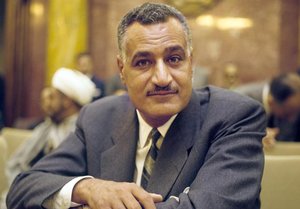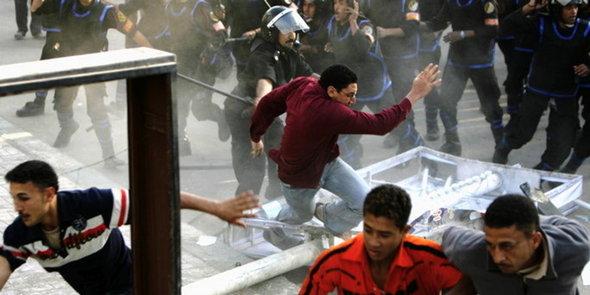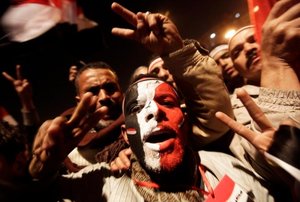''I'm expecting a second revolutionary wave''
Khaled Ali, you are a successful lawyer and activist representing the concerns of workers, farmers and students. What motivated you to enter the world of politics and the presidential race?
Khaled Ali: I would like to bring the concerns that I have so far represented in the courts into the public arena, as a way of increasing awareness and broadening impact. As president, I could throw my weight behind those concerns on a political level and on a larger scale.
At 40, you're the youngest presidential candidate in these elections. Gamal Abdel Nasser became president of Egypt at the age of 36. Do you see yourself following in his footsteps?
Khaled Ali: Of course I admire Nasser for what he achieved for the populace, but I differ from him and his politics on several levels. I believe in a civil society, a civil government and social justice, issues that I am especially committed to. I want to establish a democratic nation.
Nasser's vision was one of a united Arab nation. This vision evaporated under Sadat. Do you plan to revive this nationalistic ideal?
Khaled Ali: We don't want to revive the vision of Abdel Nasser, but we aspire to an alliance with individual Arab states. In a larger context, we also aim to work with the African continent.

We want to convey the dream to all nations, make them realise that they can improve their situation and eliminate the poverty situation in which the continent and Arab states are currently trapped.
If you became the president of Egypt, which nations would be Egypt's key partners?
Khaled Ali: The countries of Africa and the Arab states. All those nations who seek independence from industrialised first-world nations. The world is bigger than Europe. We will appraise which nations best serve Egypt's interests. Relations with other countries will be based on common interests. We want to determine our future ourselves. We won't accept economic or political notions imposed upon us by the United States.
Relations with Israel are a particularly sensitive issue. There has been repeated criticism of sales of cheap natural gas to Israel in recent years. What's your view on the matter?
Khaled Ali: All commercial and economic contracts agreed with Israel during Mubarak's rule are undergoing assessment to see just how far they serve the interests of the people of Egypt. We cannot accept that people in Spain, Israel and Jordan are buying Egyptian gas at a cheaper price than the Egyptians themselves.
It is normal that after a revolution, a nation scrutinises all contracts signed under the former regime. As far as the peace accord with Israel is concerned, we will honour it as long as Israel does the same. This must be based on mutual respect.
More than a year after the revolution, young, left-wing, secular forces in Egypt are still badly organised. It has long been common knowledge that after the fall of Mubarak, the Muslim Brotherhood would come out as the only well-organised group. Why didn't the young revolutionaries immediately begin to form political parties and draw up agendas?
Khaled Ali: The main reason was a lack of money. The revolutionary, left-wing groups have practically no funds. If they had just half of what the Islamist groups have, things would look very different, because people know them through their commitment to disadvantaged members of society.

There is not a single satellite broadcaster who would represent the left wingers, as opposed to at least six Islamist channels representing Islamist parties, not to mention the numerous purely religious broadcasters. The same goes for newspapers. There is not a single one representing the left wing, while there are at least five serving as a mouthpiece for Islamist parties.
What strategies do you have in place to undermine the two major power blocs, the Islamists and representatives of the old regime?
Khaled Ali: Anyone wanting to engage in politics has to go out on the street and talk to the people – as well as working in poor districts, setting up courses, supporting groups and basically maintaining a presence in these areas. We've got a long road ahead of us – and it's going to cost us not just time but also money and effort – if we're going to fight against the Islamic alliance that currently holds the nation in its grip.
Not that I'm pessimistic. On the contrary, I'm optimistic about the future and I think it's quite possible to defeat both camps, the Islamists and the old regime. But it's going to take time. We still have to work very hard on the streets to win this battle. And not just through debates and protests against the army, military council and the Islamists, but also through concrete work with the people at the grassroots of society.
As a lawyer and activist you have been defending the rights of workers and farmers for years. You witnessed the major labour strikes of recent years at first hand. Were these strikes the prelude to the revolution that began on 25 January 2011?
Khaled Ali: I had been waiting for this revolution for years. The dire economic situation of large sections of the populace is the cause of the revolution.

And because to date nothing has changed in this regard, I'm expecting the revolution to go into a second wave if the new president and parliament don't fulfil public expectations of an improvement in their economic situation and social justice.
Many companies were privatised under Mubarak. Would you reverse these privatisations?
Khaled Ali: In my capacity as lawyer, I have filed several corruption charges against privatised companies and demanded their re-nationalisation. If it can be proven that corruption was involved in the privatisation of these concerns, then they must be brought back into the public sector.
Are private companies more corrupt than public ones?
Khaled Ali: Corruption is widespread. It was systematically introduced by the old regime and to this day, it's still a huge obstacle to the establishment of a democratic country or system. We are battling corruption in both the private and the public sector.
In a class action lawsuit for several workers in the public sector, you secured a minimum wage of 1,200 Egyptian pounds (150 Euro). Do you plan to introduce minimum wages for all public sector workers?
Khaled Ali: Yes, I am committed to securing minimum wages. I am also currently representing a lawsuit in favour of maximum wages in the public sector. But it's not just about wages. At the same time, I'm also fighting for better conditions for workers and farmers with respect to the cost of healthcare, education, land rights and debt relief for farmers. All this must be integrated into Egypt's wage structure in the coming years.
If you are elected the new president of Egypt in June, you will have to contend with an Islamic parliamentary majority and probably also an Islamic prime minister. How will you manage this scenario?
Khaled Ali: The prime minister doesn't necessarily have to be drawn from Islamist ranks. If I become president, I can appoint both the government and the prime minister. The new constitution hasn't been written yet. If we retain the old presidential system, then the president elects the government. I will do my utmost to reach an understanding with the Islamist-dominated parliament. But if it comes to a confrontation, I would remain committed to my convictions with the support of the public.
Interview conducted by Susanne Schanda
© Qantara.de 2012
Translation: Nina Coon
Editors: Arian Fariborz, Lewis Gropp / Qantara.de
